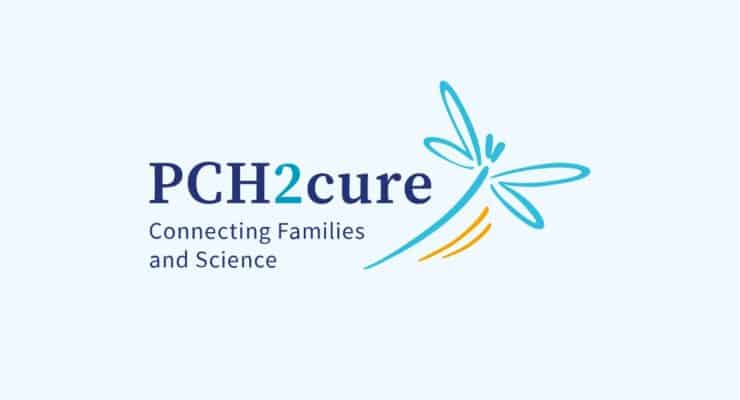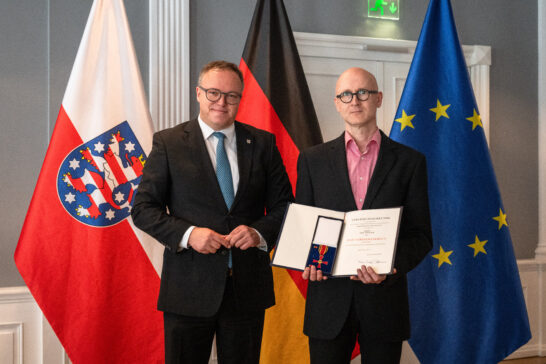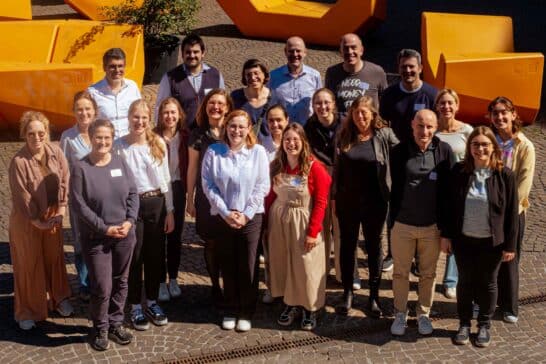„A child with PCH2 changes you for the better“
Lisa, the mother of little Max, talks about her journey to a diagnosis and her initial difficulties in feeding Max properly. She takes us through a typical day in her family and lets us take part in some special family moments. Convinced that as a family they will find solutions and ways to overcome future challenges, the parents want to fully enjoy life with Max and the time they spend with him.
Dear Lisa, who is in your family?
We are dad Jan (33 years old), mom Lisa (33 years old) and Max (almost 2 years old). And of course Elsa, the little family dog. We are newly engaged and have been living with Max in Detmold, Germany, since the end of 2023.
How did your PCH2 journey start?
Immediately after birth, we and the midwife noticed how little Max was drinking and that he wasn’t gaining weight quickly enough. When a visit to an osteopath didn’t help either, we were sent to a specialist in manual therapy and neurorehabilitation in Bochum. This specialist suggested for the first time that something was not quite right. That was 10 days after Max’s birth. Later on, he was also the one who suggested an MRI.
How and when did you get the diagnosis PCH2?
The hypoplasia (editor’s note: hypoplasia of the cerebellum, i.e. the cerebellum is too small) was clearly visible on the MRI. After the MRI, we went to the youth welfare office for initial help. However, PCH2 was not diagnosed until 10 months later, in April 2023, by the Osnabrück Human Genetics Department. Until then, however, the path was rough.
What was the hardest part for you in the early days with Max?
Deciding whether to have a nasogastric tube or a feeding tube, deciding whether we needed to go to hospital because of all the vomiting or whether it was still manageable. Making all these important decisions without a diagnosis – just on instinct – was very hard.
Also the many times when he was in pain or there was air in his stomach and we didn’t know how to help him.
But the hardest part was definitely the long feeding sessions: giving a bottle or feeding porridge for hours on end, all the while trying to gently get the food down his throat before he vomited it up again. All those hours and all that effort for nothing, because his weight often didn’t change for a long time. It was very frustrating and took its toll on my strength and nerves.
Who or what helped you the most during this first difficult time?
We were really unsure what to do but our contact at youth welfare office took great care of us.
She was also the one who suggested the nasogastric tube when Max still had considerable difficulty gaining weight after 5 months. She still visits us occasionally to this day, and we are still so grateful for having had someone at our side during this uncertain first year who we could call at any time and who always offered us advice.
Many friends and family were often at a loss, too, or didn’t know anything about the situation. Having your own network is a good support system. However, when it comes to difficult questions or decisions, it helps to have someone who has been through it all before.
What are Max’s symptoms? Did they change over time?
Max is unable to grasp purposefully and therefore “paddles” aimlessly with his arms. His arms and legs were severely affected by spasticity, but his arms became gentler over time. However, his spasticity is still so severe in one leg that the head of his femur is at risk of slipping out of the socket.
Max is able to control and support his head much better now, so he enjoys sitting upright. However, he cannot sit on his own. When lying on his belly, he can turn his head right to left, but cannot hold it up for long.
Max can see contrast well, especially when objects are close and illuminated. He can also track them to some extent.
Max cannot swallow well, no matter if food or milk. He is therefore fed exclusively via a feeding tube (PEG tube). He often swallows air, which causes him a lot of pain in his belly. He can rarely lie flat because of this. His digestion is irregular, but these symptoms always fluctuate.
His restlessness sometimes makes it difficult for him to fall asleep. This is particularly noticeable during the day. In the evening we have a routine that helps him get to sleep.
Which symptoms do you consider the most difficult for you and Max?
The swallowing difficulties bother him so much that he tends to aspirate (editor’s note: inhalation of food) when there is too much saliva and secretion, causing him to cough a lot, especially when teething. This causes him to suffer.
It is also difficult for him to get rid of the air in his stomach on his own. It often helps to ventilate him via his PEG tube.
Positioning him is not always easy. Many positioning aids are designed for lying down, but Max likes to be upright. When he is too tired for the therapy chair, however, he often half-sits in our arms or in the arms of the carers. Even though this is wonderful, it is also very time-consuming and makes him even more dependent on constant care.
What helps you to manage your daily life as a family?
It certainly helps that we share responsibilities. We take turns administering the medication in the morning and evening, preparing the pump and changing the bottles.
And of course the nursing service helps us a lot. Only thanks to these nursing hours can we both go to work and gradually get back to a normal routine.
The exchange with other affected families as well as the PCH Forum in general also helps us greatly to overcome problematic situations.
Friends and family enable us to enjoy little breaks once again and offer to watch Max for us.
Which tools would you not want to miss?
We definitely wouldn’t want to do without the therapy chair and the nursing bed. Another PCH2 family we know has given us a gravity chair, which we also use a lot. Apart from that, we are not very well equipped yet.
What are the greatest challenges you face in daily life?
Going to the supermarket alone with Max is a huge challenge. Others put their child in the shopping cart, but we can’t do that.
It’s also challenging to coordinate all the therapy appointments in such a way that they are compatible with our working hours, but also don’t overload Max’s personal time. Communicating with doctors, health and care insurance companies can also be very stressful.
Could you take us through a “normal” day in your family?
Max starts to get restless and wakes up at around 6:30 am. Then one of us gets up with him and changes his diaper. Then he is given his omeprazole via the PEG tube in the kitchen and the PEG pump is prepared for the day. Max gets ready for the day and the pump is connected. Next, we put Max in the gravity chair or the baby bouncer and place him facing his blanket with contrast pictures so that we can get ready for the day while he watches baby TV.
The nursing service arrives at 7:30 a.m. and after a quick briefing, Jan and I go to work. I’m usually back at lunchtime and sit down with the nursing staff to ask how the morning went.
The nursing service leaves at 2:30 pm. Max and I then go to appointments (physiotherapy, speech therapy, playgroup) or I take Max for a walk in the baby stroller. It’s important that Max sleeps once during the day, which works really well in the stroller. But usually the nursing service gets him to sleep before.
We are back home by 6 pm at the latest. Then we play a little, listen to music or cuddle.
Our evening routine begins at around 7 pm (getting changed, brushing teeth, another dose of omeprazole). Then the last bottle is connected to the PEG, we read a story or turn on a bedtime tonie, and then it’s off to bed. Max likes to sleep on his side, but often needs physical contact. So we stay until he is fast asleep.
He usually sleeps until around midnight, and when he wakes up, we take him into our bed because this helps him sleep better.
We both have Fridays off and enjoy the day with Max without the nursing service. Max also has a full schedule on this day, but we take it a bit easier.
Tell us about your favorite family moments so far.
We traveled together as a family in a camper for about 4 weeks in our first summer and showed Max so many beautiful spots in Europe. He slept unbelievably well on this trip and really enjoyed the time. We had some wonderful moments in the camper and on the beach, especially in France on the Atlantic coast.
In summer 2022, we also went hiking in the mountains, and Max loved sleeping in the carrier during the ascent. He is quite the little globetrotter and loves exploring new countries.
In November 2023, we visited the hospice here in Bielefeld-Bethel for the first time. When we returned home, feeling recovered and well-rested, Max and Elsa greeted each other enthusiastically and cuddled on the blanket. This demonstrated in a very special way how closely bonded the two are, even without much visible interaction.
What has changed over time and how are you doing as a family today?
As a family, we are calmer, deal with stressful moments easier and have learned that everything will be okay in the end.
The eating situation and therefore also Max’s weight has drastically improved thanks to the PEG, even though we hesitated for a long time about having this procedure done. But in hindsight, we know we can trust our gut feeling and that we will find a solution. Somehow, the diagnosis and the associated wealth of information have made us more confident and we have had many eye-opening experiences.
We try to live by the motto “quality over quantity” and to always enjoy the present moment. We want to make the most of the time we have with Max.
What do you wish for Max?
We hope that Max can live his life pain-free and without suffering. He deserves to stay as happy and untroubled as he sometimes is. We also wish that no obstacles are put in his way when it comes to medical aids and that things are set up to make his life easier. We hope that he remains aware for a long time and that he continues to perceive everything around him fully.
Why is Max someone really special?
Max is often cheerful and laughs energetically. He is a bright little boy and proves to others, as well as to us, every day that it doesn’t matter how fast you can walk, how fluently you can speak or how well you can see. He is happy with what he has been given and is content within his limitations. Many others still have to learn that.
What advice would you like to give to the parents of a child who has just been diagnosed with PCH2?
We would like to tell them that it will get easier. Many question marks will gradually disappear and solutions will emerge for many issues; medication, medical aids or the passage of time will solve things. Of course, PCH2 children are always entitled to special help and care, but it is important to also look beyond the illness and always remain positive. PCH2 children can teach us a lot and will almost always make us a better person over time.
„A child with PCH2 changes you for the better“
(Lisa)
Share Your Own Story
to support and encourage other families on their journey.


